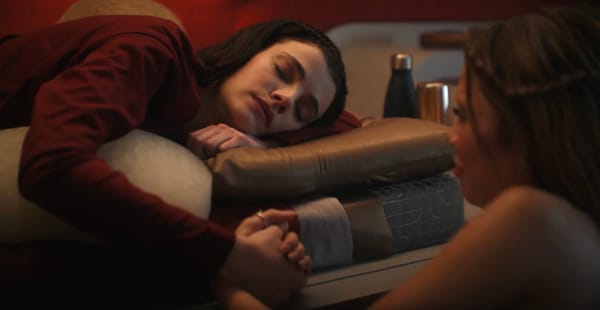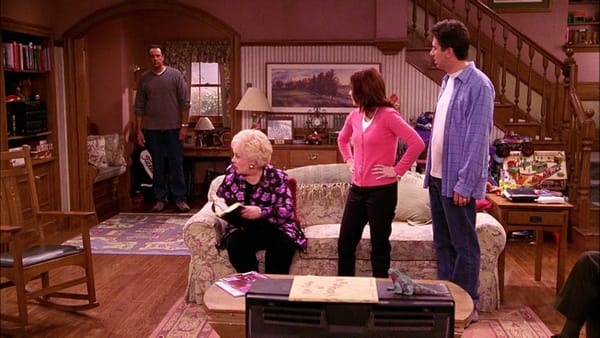All of the things my parents thought I would be
And all of the things I wasn't

(Continued police violence directed against Black Americans is a horrific problem that we, as a nation, are hopefully finally reckoning with. I want to be conscious of the ways in which this is a conversation where my voice isn’t needed as much as the voices of others, so this newsletter is going to stick with its regularly scheduled programming, which in June is a series of Pride posts on trans stuff. But it’s important to use what platform I have to direct you toward folks who could use your money, if you have some to spare. If you have the extra cash, donate it to the Marsha P. Johnson Institute, which protects and defends the rights of Black trans women.)
Underneath my kitchen cabinets is a paper towel dispenser. It sits perpetually empty, because neither my wife nor I can be bothered to take the time to fill it when we can just have a paper towel roll sitting on the counter. But neither of us particularly wants to take it down either.
The paper towel dispenser was a gift from my parents, who gave it to us when we first moved to downtown Los Angeles from Long Beach in 2015. We dutifully filled it a few times, then went back to just setting paper towels out on the counter. When we moved apartments in 2018, my parents came to help us move, and once again, they moved the paper towel dispenser. This time, they even filled it. We stopped using it almost immediately.
Now for many people, a paper towel dispenser might be the height of luxury. My parents certainly love theirs, which may be why they gave one to Libby and me. If they liked it, then it must be good enough for us! But all of that ignores who we are and the kind of people we’ve grown up to be.
My sister and I have a running joke about all of the times we’ve asked for a specific gift for Christmas or a birthday, only to be given something by them that’s almost but not quite the thing we want. For instance, one year, I asked for a pour-over coffee maker, because I am one of those awful white people who is pretentious about coffee. Instead, my parents bought me a gigantic electric coffee pot of the sort they used. It’s now sitting, unused, atop my refrigerator, and my wife and I use the pour-over coffee maker we bought ourselves every single morning. (If you live in Los Angeles and want a gigantic electric coffee pot, it’s yours.) (I think I’m serious about this?) Many, many similar things have happened with my sister and her husband. We have a firm idea of what we want, our parents decide we actually want something more like what they want, and we repeat this cycle endlessly.
And every time I see the red light of that paper towel dispenser gleaming in my kitchen, to indicate that it’s empty and needs to be fed paper towels, I feel a little less like the daughter my parents wanted. (Okay, they didn’t even want a daughter. They wanted a son. But That’s The Subtext.)

I don’t know anyone who doesn’t have some element of this dynamic in their relationship with their parents. They have gone off to their own adult life, and their parents can still, on some level, only see them as the tiny babies they once toted around and were completely responsible for. I have enough friends who have become parents themselves to realize how inevitable this is. When you are completely responsible for the health and well-being of another human, it’s hard to suddenly let that human have all of the autonomy they need.
That difficulty in letting go is fine. It’s human, even. I can’t imagine having a child, then realizing that child will, at some point, have a life where they don’t necessarily need to include you, where they have to make a choice about how much you’re going to be a part of their life. It’s only natural, in that case, to give them paper towel dispensers as a kind of proxy for emotional love and support. “I hope you understand how much we love you,” that little red light says, “and how disappointed we are in the fact that you didn’t fill this paper towel dispenser, because our love still has strings attached here and there.”
An anecdote I’ve told often to friends is that my parents didn’t particularly want me to be a writer. They could admit I had talent, and they could even go so far as to admit I could probably make a living at it if I really applied myself. But they always had other dreams for me — they wanted me to be a professional piano player. (That or an eye doctor. My dad always thought I would make a good eye doctor based on… I honestly don’t know what.) The idea of my parents wanting me to pass up an inherently insecure career path in writing in favor of an even less secure career path in professional piano playing always makes friends laugh. But it underscores a deeper truth I’m only starting to understand now.
When I was a teenager, I understood, bone deep, that for as good as I was at playing the piano, I would never be good enough to make a serious career out of it. But I also understood that I might be good enough to work consistently as a writer if I really honed my skills. I know this to be true about myself. The me who became a piano player probably has a day job and plays the organ at his church (the pronoun is deliberate); the me who became a writer is typing this to you right now.
A couple of years ago, when we still spoke, I jokingly brought this up with my parents, who admitted I had been right about the whole writing thing but also insisted I could have been a piano player if I really wanted to. And maybe. Maybe they’re right. Somewhere in the multiverse is a version of me who made it as a piano player and regularly performs with the New York symphony or something. But this version of me could only understand herself (the pronoun is deliberate) through writing.
For a while there, I thought gender dysphoria could explain everything about me. Yes, I had adoption trauma that stemmed from being put into foster care as a tiny baby. (I was adopted by my parents at two months old.) And yes, I had religious baggage from the time I spent in a fundamentalist evangelical Christian church growing up. But the “I am a girl” puzzle piece in my head snapped into place in such a way that I thought it would make sense of everything else.
But it didn’t. Realizing I was a woman didn’t suddenly erase all of the shame I had crammed into my brain in the fundamentalist church, and it didn’t placate baby me with the promise that it would all work out someday. Regardless of my gender, those two cornerstones of my life were there, propping up a bunch of stuff I didn’t want to think about. And now, with the dysphoria largely managed, I’m thinking about them. I’m thinking about them a lot.
Everything good in my life — my wife, my home in California, my career, my gender — has been something that powerful people in my life tried to get me to give up at one point or another. That I managed to accomplish all of these things in spite of that pressure is a tribute to my stubbornness, if nothing else. But it’s also a tribute to the sheer, raw certainty that queer people have in general.
I have been an out trans woman for three Pride months now. The first, I was so hidden away that I didn’t dare go to any Pride events, lest I be spotted and plastered all over the internet. (I had a very distorted view of how much anybody cared about my gender in 2018.) The second, I went to the trans Pride event at the LA LGBT Center, and I had a great time. (I gave Jamie Clayton a drink ticket, then gave her another one when she was only supposed to have one. Ask me how!) But I didn’t really feel like Pride was for me, even though it clearly was. What had I struggled against? What part had I played in the push for queer rights? Who was I to suggest a movement whose only requirement was “maybe be queer?” to join should accept me? I was just some dumb girl who had convinced herself she knew better than anybody else who she was and had paid a price, over and over again, for that.
This year, though, I’ve come to feel, deeply, that Pride is a celebration that has a place for me, even as Pride has largely fallen by the Covid-19 wayside. It is a celebration not of our identities — though it is that — but of our stubbornness, of our certainty that if the world didn’t have a space for us, we would have to fucking make one. I could not have less in common with so many people in the queer community except for the fact that we all risked something to be there.
There may come a day when LGBTQIA+ folks are so deeply integrated into society that something like Pride feels like an archaic leftover from a less enlightened time. But given how slowly movements toward true social justice and equality move — I’m not holding my breath that day will come anytime soon. And until then, it’s worth celebrating that we’re here, and we’re together, and we’re fucking alive. There’s a world full of people who tried to tell us otherwise, and we made it anyway. And we’re helping more and more people climb the ladder after us.
My favorite line from Hamilton has always been “Tomorrow, there’ll be more of us.” It’s meant as a call to the revolutionaries at the show’s heart, but it’s about how any movement eventually finds a way to pull in more people who agree with its aims, either because they realize they belong to it or because they realize they are fellow travelers. Since I came out as trans, I have found friends, I have found life, I have found community. I have found all of the things I longed for and could never have, and it was by doing the very thing I had been warned not to. It turned out the thing that was scariest about transition was the first step. Every step after hasn’t been easy, but it’s been easier. But first, it took admitting I had been misled all along. And now, every day, more and more people slide into my DMs questioning their gender, wondering what it might mean to move toward something more honest for themselves. Tomorrow there’ll be more of us.
I don’t know what this means, exactly, but I do think it means I might take down that paper towel dispenser. I never liked it much anyway.
What I’ve been up to: So Eliza, Vox’s critic-at-small, and I talked about Looney Tunes, and it was a true delight. But the biggest highlight of my week was my story about Rev. Junia Joplin finally being available to everybody. It’s one of the best things I’ve ever written, I think, and I’m notoriously hard on myself. Thanks to Lavanya Ramanathan and Jen Trolio for smart edits that made this what it became.
I spoke with June on the evening of Saturday, June 13, less than 12 hours before she would leave her current wilderness and enter another entirely, by coming out in the form of a sermon. She’s been asked several times by the clergy she’s trusted enough to confide in why, precisely, she wanted to come out in a sermon, rather than telling her church’s leadership board, then going on up through the denomination’s official chain of command to let everyone know she would be transitioning. Only then would she come out, possibly in a sermon, if everybody was cool with that.
The truth is that this plan is June’s best chance at keeping her job. When I asked her why she wasn’t going through official channels, she rattled off the names of several trans women pastors who tried to do so and were summarily removed from their jobs, before they could become a news story and create an uncomfortable situation for their churches.
So here I am. This is now a news story. You are part of June’s story, too, her bulwark against an easy dismissal.
Read me: The collapse of the supposed progressive bastion that was Cards Against Humanity has been swift and brutal (and for those of us who never quite understood the appeal of the game, vaguely worthwhile). To make sense of it, read Aja Romano’s explainer at Vox, this reported feature from Nicole Carpenter at Polygon, and this heartbreaking rundown of one man’s time at the company that ended with him being institutionalized, he claims at the company’s behest.
I had the problem many people from poor families have. I couldn’t afford to speak up. It’s ironic that the web of discretion extends to the rich kids too. One writer, a New Jersey improviser, had an Au Pair growing up, a word I didn’t learn until I was 26, and travels to NJ to see her family in their palatial Jersey estate about ten times a year, but she was terrified of speaking up. I can’t count how many times I tried to get the CAH writers to unionize. They were petrified of being fired. For me, though, my entire life depended on my job.
That changed when I started working as a copywriter at a mid-sized agency in downtown Chicago. The job payed 40 an hour and by the end of 2018, I was working there 40 hours a week. The job at CAH was the same hourly, but only 12 hours a week. Plus I liked the copywriting work. I got to write with the best writers I still have ever worked with, people who grew up in the golden age of Second City- the 90s. They had performed and written with Martin Short, and Tina Fey, and are themselves of that cut of comedy talent.
I could suddenly speak my mind because I didn’t need the job. That was when the Head Writers Jo and Julia came into the writing room and told us that they and Max had been forced to veto the n-word as a card. The way the CAH writing process worked before we came was that the eight owner-writers, all equal stake-holders, would write cards remotely and submit them into an anonymous google sheet. They would then go over the cards and highlight ones they liked. Those highlighted cards were put into another Sheets tab called the short list. Those cards would be discussed and punched up in hours long writing meetings. (Punching up refers to the process of improving jokes by clarifying the language or humor of them)
Watch me: I discovered the YouTube channel of T1J after someone linked to his piece on Tina Fey’s weird use of racial humor, but I’ve been watching more and more of his videos, and they’re excellent. As someone whose YouTube consumption skews a little too white, I’ve been grateful to have his perspective on many of my favorite topics.
And another thing… My wife interviewed Chris Evans and Michelle Dockery this week, and the important thing to know is that CHRIS EVANS IS SO HANDSOME, and the second most important thing to know is that he has a lot of cool things to say in this interview, and the third most important thing to know is that HAVE YOU SEE HIS ARMS THO???
This week’s listening music: “I’ll Have to Dance with Cassie” by God Help the Girl
Episodes is published once per week and is about whatever I feel like that particular week. Suggest topics for future installments via email or on Twitter. Read more of my work at Vox




